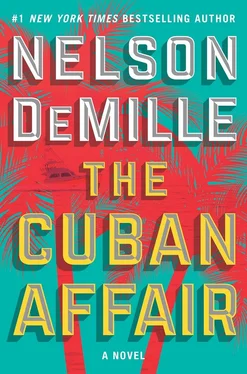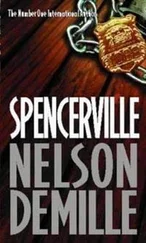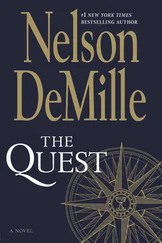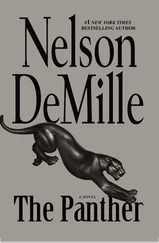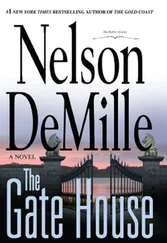A young waitress wearing black pants and a pink T-shirt came over to our table and wished us buenos días as she checked us out, maybe trying to determine our national origin. I’m Canadian.
Sara returned the greeting in Spanish, then said in English, “We’d like to see a lunch menu, por favor.”
“Sí, señora.”
I thought Sara was señorita. This trip must have aged her.
“Meanwhile,” I said, “I’ll have a beer. Do you have Corona?”
“Sí.”
There is a God. I asked Sara, “Have you thought about what you would like, Anna?”
“Well, Jonathan, I’d like a daiquiri.”
“Just like in Toronto.” I said to the waitress, “A daiquiri for the señora, por favor — eh?”
“Sí, I will return.” And she left.
Sara said, “You’re an idiot.”
“You have to immerse yourself in your cover story. Didn’t they teach you that?”
She had no reply.
“Can we hang out here until seven?”
“This place closes at four-thirty.” She looked at me. “Sometimes, before a clandestine rendezvous, it’s best to be static. Sometimes it’s best to be mobile.”
“They taught you well.”
“I read Richard Neville novels.”
“Don’t confuse fact with fiction.” Which reminded me of something. “Do you have our group roster?”
“I do. I took it in case we could use it for cover. Why?”
“I want to get a Hemingway postcard from here and send it to Richard.”
“Please focus on the mission.”
“I have many missions in life.”
“Not if you don’t complete this one.”
“Right.”
I looked again at the beach. The sand was almost iridescent, with a touch of blue and pink, and the water was a deep aquamarine. But farther out, I could see whitecaps and wispy clouds scudding quickly from east to west. There was a weather system on the way.
The waitress returned with our drinks and two lunch menus, and I noticed the prices were in CUCs only, which effectively barred Cubans in their own people’s republic. The waitress said she’d come back for our orders, but we didn’t let her get away. We both ordered the specialty of the house, which was a lobster salad, and I ordered two bottles of water and papas fritas — french fries. I asked the waitress, “Do you know where I can buy postcards?”
“Sí. Inside you will find these.”
“Gracias.”
Sara asked, “Los baños?”
The waitress directed us to the baños, took our menus, and left.
I asked, “What are we going to do with all our Cuban pesos?”
“Save them for next time.”
Send me a postcard.
Sara took her backpack and stood. “Keep an eye on our cargo.”
“Find me a Hemingway postcard.”
So I sat there, rehydrating with my Corona, which, though it came from Mexico, brought back memories of home. And I looked out at the sea in the same way that the Habaneros on the Malecón stared wistfully at the Straits of Florida. So near, yet so far.
Actually, Cayo Guillermo was about three hundred and fifty kilometers from Key West — about two hundred and fifty miles from Cayo to Key. That would be about a ten-hour cruise at twenty-five knots, depending on winds, waves, and tides. If we left here at midnight tonight, we should be at Charter Boat Row no later than 10 A.M., and at the Green Parrot in time for lunch. And Fantasy Fest was still in full swing.
More important, we should be in international waters an hour after leaving here, theoretically safe from Guarda Frontera patrol boats.
I wasn’t sure what the plan was to transfer our cargo to Fishy Business , but we’d find out at 7 tonight, and I hoped the plan didn’t rely too heavily on a prayer to the Virgin Mary. If it did, I, as captain, would change it.
One of the obnoxious kids ran over to me, a six- or seven-year-old porker wearing only a bathing suit. He had a paper cup of french fries in his hand that I would have broken his wrist for. He stuffed a handful of fries in his mouth and inquired, “Where are you from?”
“Canada. Can’t you tell?”
“We’re from Hamilton. Where are you from?”
“Toronto.”
“You sound like an American.”
“Go play in the riptide.”
“You’re an American.”
“Are you a chivato?”
“What’s that?”
“Give me a french fry and I’ll tell you.”
“You mean a chip.”
Busted by a six-year-old. “Right.”
He stuck the cup toward me and I grabbed a few fries — chips — before he pulled them away.
“What’s a... chovi—”
“Comemierda. It’s a smart person. In Spanish. Say it.”
He got it right on the second try and I encouraged him to use the word with the waitstaff.
His mother called to him to stop bothering the nice man and he ran off with his chips, yelling, “They’re Americans!”
Thanks, kid. Well, it wasn’t a crime to be an American in Cayo Guillermo, but it was a crime to be Daniel MacCormick and Sara Ortega in Cuba. I should have shown the kid my Canadian passport. If it fooled him, it would fool the police.
Sara returned and I decided not to mention the kid. She didn’t spook easily, but she might want to leave before I got my lobster salad.
She put a stack of postcards on the table. “Pick one. We’ll keep the rest as souvenirs.”
I was hoping for three million dollars to remember Cuba by, but I wasn’t allowed to say that.
I flipped through the postcards and found one of a fishing boat that said, Cayo Coco and Cayo Guillermo, Where Ernest Hemingway Loved to Fish. Perfect. “Dear Richard, I hope you liked your T-shirt and I hope you and Cindy went to Rolando’s.”
“And I hope you get to mail that postcard from Key West.”
“We will.”
So we sat there and enjoyed the moment. I glanced at the Buick Roadmaster in the parking area. Almost as important as us getting out of Cuba alive was getting our cargo safely and secretly into the U.S. And that made me think ahead to the American Coast Guard cutters and the DEA intercept boats. But Jack and I and The Maine — now Fishy Business — were in the computer system and we were considered trusted boat owners and crew, and we knew some of the Coast Guard people by name and we’d chatted with them on the radio. Same with U.S. Customs in Key West. And that, I knew, was one of the many good reasons why Carlos and his amigos picked Jack and me for this interesting job.
Our lobster salads and fries came and we ate and drank in silence, dividing our attention between the sea and the parking area where the Buick wagon sat — and where the police would come if they were looking for us.
Well, we’d gotten to Cayo Guillermo, and we’d learned that the fleet was still here. That was the good news. The bad news was that Sara and I were by now the subject of a nationwide police hunt. But Cuba was a big island, and the police, as in most police states, were better at intimidation than police science. I was sure that most fugitives were found as a result of chivatos tipping off the police. So we were relatively safe here, in a chivato-free zone.
Unless, of course, the police had made the connection between me and Fishy Business , which could have happened an hour ago, or could happen an hour from now.
So that was my analysis of enemy strengths, weaknesses, and capabilities. Now for my friends.
First, there was Eduardo on the loose. I probably should have stuffed him in a car trunk in Chico’s garage, but Sara would have been upset.
Next, I still hadn’t gotten my surprise. It wasn’t my birthday, so it had to be something else. Maybe the plan called for leaving me and Jack in Cayo Guillermo. Surprise! But they needed us for the press conference — unless that was all bullshit. But they also needed Jack and me to get the boat past the Coast Guard, and to avoid U.S. Customs. Also, now that we didn’t have the sixty million dollars with us, the chances of Jack and I being double-crossed were greatly reduced. But not zero.
Читать дальше
